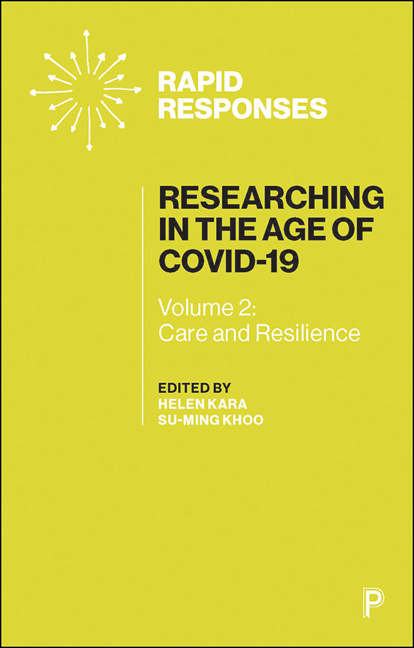8 - Piling on the Pressure? Negotiating Burden/Benefit Dynamics in Social Research During Times of Crisis
Published online by Cambridge University Press: 23 March 2021
Summary
Introduction
At a time when governments globally are making major decisions in response to the coronavirus (COVID-19) pandemic, there has perhaps never been greater need for robust research evidence to support rapid decision-making processes. While the pandemic is understandably perceived as a health crisis, Teti et al. (2020, p 1) contend that ‘COVID-19 is not just a medical pandemic; it is a social event that is disrupting our social order’. Certainly, coronavirus has had a huge impact on the way we live our lives, particularly with regard to the way we work, learn and communicate with others. As such, research is needed that can speak not just to medical matters but also to social change (Ward, 2020). Social researchers have responded readily to such need and we have witnessed a plethora of online surveys – among various other forms of research – emerging. These have sought to explore the impact of the crisis on various aspects of society and individuals’ lives. However, while much of this research has undoubtedly been done with good intentions, our own recent experiences have led us to reflect on the moral challenges of conducting research during times of crisis. In particular, we have found ourselves questioning whether the desire for rapid research – to understand the changing context – means that researchers might not have adequately considered the potentially detrimental impact of their research on the contexts within which they are working. Moreover, we have reflected on whether the changing research landscape means some voices are now heard above others and, if so, what the implications of this might be for those on the margins. Within this chapter, we discuss these issues and contest that we need to consider how beneficial research might be during times of crisis and whether the perceived benefit offsets/outweighs the potential burden that might be placed on those participating, especially if they are already under pressure, working in ‘challenged’ contexts.
Challenged contexts
There are various contexts within the UK that might be deemed ‘challenged’ – systems and services which were already under pressure long before the current crisis, with the pandemic having served only to further exacerbate these pressures. Examples include healthcare services such as the National Health Service (NHS) or education systems.
- Type
- Chapter
- Information
- Researching in the Age of COVID-19Volume II: Care and Resilience, pp. 91 - 100Publisher: Bristol University PressPrint publication year: 2020
- 1
- Cited by

